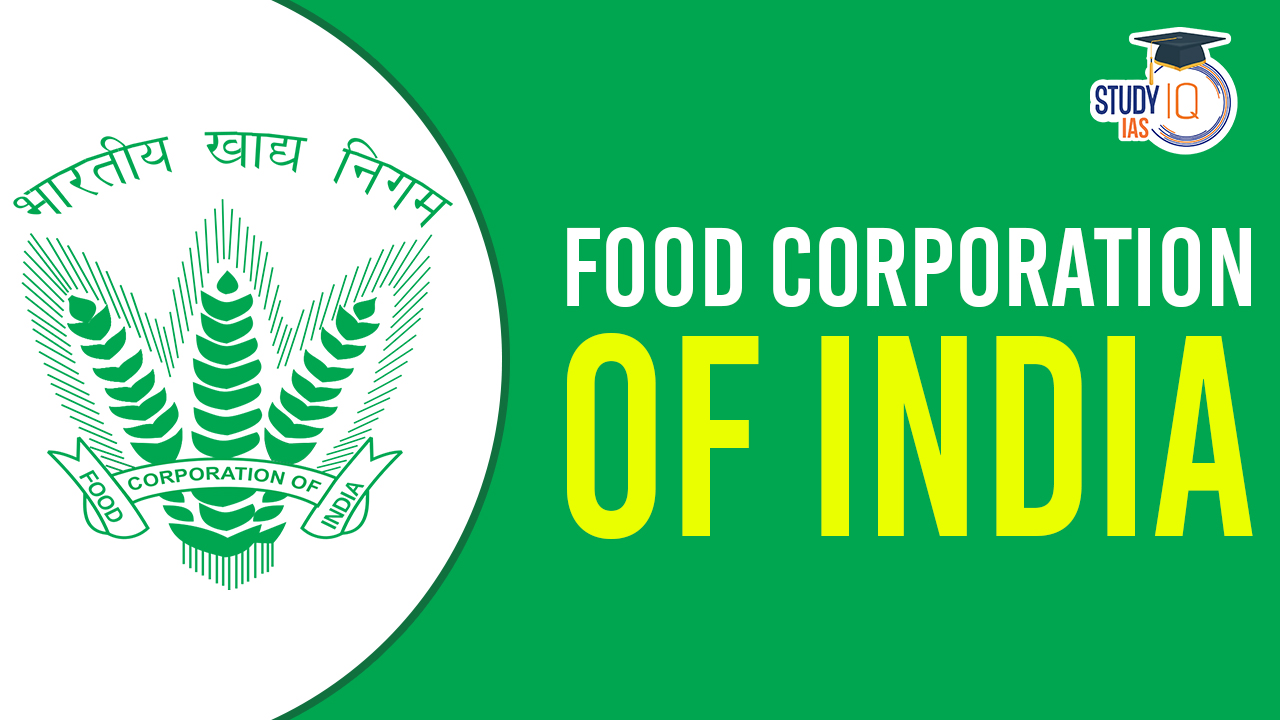Table of Contents
Food Corporation of India
The Food Corporation of India (FCI) has been a cornerstone in India’s efforts to ensure food security since its establishment in 1965. Over the years, FCI has played a crucial role in procuring, storing, and distributing food grains across the country. However, the evolving agricultural landscape and changing socio-economic dynamics necessitate a restructuring of FCI to enhance its efficiency and effectiveness. In this regard, a High-Level Committee (HLC) was constituted to provide recommendations for restructuring FCI. This article delves into the key recommendations put forth by the HLC and their implications for India’s food management system.
What is Food Corporation of India?
The Food Corporation of India (FCI) operates as a vital Public Sector Undertaking under the Ministry of Consumer Affairs, Food and Public Distribution, formed by the Food Corporations Act of 1964. FCI plays a pivotal role in ensuring food security, managing buffer stocks, and supporting the Public Distribution System, contributing to India’s agricultural growth and development.
The Food Corporation of India (FCI) is a government agency which was established in 1965, responsible for ensuring food security and the distribution of food grains across the country. FCI plays a crucial role in the procurement, storage, and distribution of food grains, primarily wheat and rice.
Food Corporation of India Overview
|
Food Corporation of India Overview |
|
| Establishment Year | 1965 |
| Purpose | Implementation of the National Food Policy |
| Under Ministry | Ministry of Consumer Affairs, Food, and Public Distribution |
| Type | Statutory Body, Public Sector Undertaking |
| Size | One of India’s largest government corporations |
| Headquarters | New Delhi |
| Regional Centers | State capitals |
| Zonal Offices | 5 |
| Regional Offices | 26 |
| Key Functions | Procurement, storage, transportation, distribution, and sale of food grains and essential commodities |
| Significance | Leading supply chain management entity in Asia |
| Join Us on Whatsapp | Click to Join |
Organizational Structure of Food Corporation of India
| Organization Level | Description |
| Top Leadership | The chairman oversees the entire FCI operations |
| Zonal Structure | Five zones – North, South, East, West, North-East |
| Zonal Offices | Noida, Kolkata, Mumbai, Guwahati, Chennai |
| Regional Offices | 23 offices reporting to respective zonal offices |
| District Offices | 166 district offices across the country |
| Depots | Numerous depots strategically located nationwide |
| Divisional Offices | Each depot is accountable to a divisional office led by an Assistant General Manager |
| Procurement Process | Purchases surplus wheat and rice from farmers at pre-announced prices, ensuring fair compensation |
Objectives of Food Corporation of India
The objectives of the Food Corporation of India (FCI) are:
- Facilitate Fair Compensation to Farmers:
- Provide remunerative prices to farmers for their agricultural produce.
- Establish Stable Food Security:
- Transform crisis-oriented food security into a stable system.
- Ensure continuous availability, accessibility, and affordability of food grains, aiming to eliminate hunger for everyone, everywhere, at all times.
- Maintain Operational Buffer Stocks:
- Ensure the nation’s food security by maintaining satisfactory levels of operational buffer stocks of essential food grains.
- Efficient Distribution for Public Welfare:
- Distribute food grains across the country to support the Public Distribution System (PDS), ensuring the availability of essential food to the general public.
- Protect Farmers’ Interests:
- Conduct effective Price Support Operations to safeguard the economic interests of farmers involved in food grain production.
Functions of Food Corporation of India
Procurement
- Central Government support for wheat, paddy, and coarse grain procurement.
- Procurement at Minimum Support Price (MSP) plus incentive bonus.
- Decentralized Procurement Scheme (DCP) for efficient PDS operations.
- Uniform quality specifications are announced before each procurement season.
- Additional nodal agency for pulses and oilseeds procurement.
Distribution
- Fulfills TPDS requirements at Central Issue Price.
- Delivers grains to State Govt./ Agencies for Fair Price Shop distribution.
- Crucial role under the National Food Security Act, 2013.
Public Distribution System (PDS)
- Originated in response to food shortages in the 1960s.
- Supplemental in nature, not intended to meet entire household requirements.
- Joint responsibility of Central and State Governments.
- FCI is responsible for procurement, storage, and bulk allocation.
- State Governments handle allocation within the state, eligibility identification, and Fair Price Shop supervision.
- Commodities include wheat, rice, sugar, and kerosene; some states distribute additional items.
Revamped Public Distribution System (RPDS)
- Launched in 1992 to strengthen and streamline PDS.
- Focused on far-flung, hilly, remote, and inaccessible areas.
Targeted Public Distribution System (TPDS)
- Launched in 1997 to benefit the poor and control subsidies.
- Transition from universal to targeted PDS.
- Aims to provide highly subsidized food grains to those below the poverty line.
- NFSA, 2013, extends coverage to 75% rural and 50% urban population for subsidized food grains.
Achievements of Food Corporation of India
- Supply: Provided 126 lakh tonnes of food grains during the lockdown, equivalent to 2.5 months’ normal supply.
- PM Garib Kalyan Anna Yojana: Record supply due to this scheme.
- Stock Management: Ensured sufficient stocks across the country to meet state demands amid the pandemic.
- Proactive Liquidation: Facilitated public procurement of bumper rabi crop, addressing storage shortages.
- NGO Collaboration: Allowed NGOs to buy wheat and rice directly for cooked food distribution during COVID-19 without e-auction.
- Continuous Operations: Working tirelessly to maintain food grain availability.
- Employee Welfare: Provided life insurance coverage to over one lakh FCI officials and labourers during the crisis.
Challenges Faced by Food Corporation of India
- Transportation Dependency: Heavy reliance on rail routes, unsuitable during crises requiring remote area deliveries.
- Containerized Transport: Not the primary mode, impacting cost-effectiveness.
- Farmer Relations: Struggles in establishing a useful relationship with Farmer Producer Organizations (FPOs).
- Distribution Inefficiency: Issues with storage and transportation leading to waste.
- Financial Debt: Deeply indebted, with a total of 2.25 lakh crores in National Small Saving Funds Loans.
- Government Liquidation: The government’s reluctance to liquidate debts may impede effective engagement.
- Subsidy Impact: Prolonged subsidized food distribution can depress food grain prices, negatively affecting farmers.
Food Corporation of India Way Forward
- Containerized Road Transport: Utilize effective and timely delivery to needy and remote areas.
- Pre-positioning Strategy: Store grains strategically in-demand hotspots, following successful international models.
- Local Storage Facilities: Utilize block headquarters and Panchayats for storage.
- Leverage Existing Networks: Engage Farmer Producer Organisations (FPOs) and rural self-help groups under NRLM for last-mile distribution.
- Financially Strapped States: Assist financially challenged states through NRLM SHG cadre and FPOs.
- FIFO Principle: Temporarily set aside in crises for quicker and cost-effective movement of food grains.
- Addressing Returnees’ Needs: Prioritize providing sustenance to those who returned home during lockdown with no means of subsistence.
- Diversified Assistance: Similar to NAFED, supports FPOs and farmer groups in moving various agricultural inputs for enhanced efficiency.


 Growth in Gold Loans and NPAs, Reasons a...
Growth in Gold Loans and NPAs, Reasons a...
 How RBI Responded To Global Trade War Ch...
How RBI Responded To Global Trade War Ch...
 Why Confidence in US Dollar is Falling?
Why Confidence in US Dollar is Falling?





















